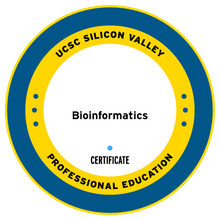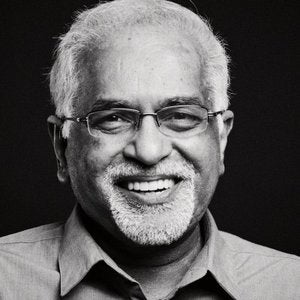Where biology meets Big Data
This Program is Perfect For
- Individuals with backgrounds in related life sciences who want to gain practical skills in analyzing biological data
- Computer scientists and data professionals branching into biology
- Career-driven learners targeting biotech, pharma, or software industries
Build your computational and scientific foundation
The Bioinformatics professional certificate program equips you with the computational and analytical skills needed in today's genomics, biotechnology, and healthcare sectors. Our curriculum reflects current industry practices, incorporating AI and machine learning applications, multi-omics data analysis, and modern workflow management alongside core bioinformatics tools and databases. The program addresses the growing need for professionals who can work effectively with complex biological datasets and apply computational methods to real-world research and medical challenges.
Certificate program objectives
- Apply bioinformatics tools and techniques to analyze biological sequences, predict molecular structures, and interpret complex genomic and multi-omics data for research and medical applications.
- Identify, manage, and evaluate bioinformatics data and workflows ensuring data quality and integrity as well as effective use in AI and machine learning applications.
- Apply artificial intelligence and machine learning tools and approaches in bioinformatics to address data and ethical considerations, and leverage appropriate computational infrastructures to enable effective analyses and biological predictions.
Courses
Program Requirements
Total: 5 courses (minimum 15 quarter units)
- 1 core course (3 quarter units)
- 3 required courses (9 quarter units)
- 1 elective course (minimum 3 quarter units)
- End with certificate of completion review.
| Title | units | Fall | Spring | Summer | Winter |
|---|---|---|---|---|---|
| Experimental Methods in Molecular Biology | 3.0 | Live-Online | |||
| Statistics | 3.0 | Flexible |
| Title | units | Fall | Spring | Summer | Winter |
|---|---|---|---|---|---|
| Bioinformatics Tools, Databases and Methods | 3.0 | Online Traditional | |||
| Data and Workflow Management for Bioinformatics | 3.0 | Flexible | |||
| Machine Learning and AI in Bioinformatics | 3.0 | Live-Online |
| Title | units | Fall | Spring | Summer | Winter |
|---|---|---|---|---|---|
| Relational Database Design and SQL Programming | 3.0 | Flexible, Online Self-paced | Online Self-paced | ||
| Next-Gen Sequence Analysis Tools - A Hands-On Approach | 3.0 | Online Traditional | |||
| DevOps Technologies | 3.0 | Live-Online | |||
| Principles of Drug Discovery | 3.0 | Live-Online |
| Title | units | Fall | Spring | Summer | Winter |
|---|---|---|---|---|---|
| Bioinformatics Certificate Completion Fee |
| Title | units | Fall | Spring | Summer | Winter |
|---|---|---|---|---|---|
| Personal Development Seminar: Concepts in Next-Gen Sequence Analysis | Online Self-paced |
1. Core Course(s): Choose One
- Live-Online Attend via Zoom at scheduled times.
| Date | Start Time | End Time | Meeting Type | Location |
|---|---|---|---|---|
| Wed, 01-14-2026 | 6:30pm | 9:30pm | Live-Online | REMOTE |
| Wed, 01-21-2026 | 6:30pm | 9:30pm | Live-Online | REMOTE |
| Wed, 01-28-2026 | 6:30pm | 9:30pm | Live-Online | REMOTE |
| Wed, 02-04-2026 | 6:30pm | 9:30pm | Live-Online | REMOTE |
| Wed, 02-11-2026 | 6:30pm | 9:30pm | Live-Online | REMOTE |
| Wed, 02-25-2026 | 6:30pm | 9:30pm | Live-Online | REMOTE |
| Wed, 03-04-2026 | 6:30pm | 9:30pm | Live-Online | REMOTE |
| Wed, 03-11-2026 | 6:30pm | 9:30pm | Live-Online | REMOTE |
| Wed, 03-18-2026 | 6:30pm | 9:30pm | Live-Online | REMOTE |
| Wed, 03-25-2026 | 6:30pm | 9:30pm | Live-Online | REMOTE |
Students may still enroll if they missed the 1st class session. However, they need to communicate with the instructor via Canvas and catch up on all missed work prior to the 2nd class meeting.
This class is offered in an online synchronous format. Students are expected to log into this course via Canvas at the start time of scheduled meetings and participate via Zoom, for the duration of each scheduled class meeting.
No meeting on February 18, 2026. To see all meeting dates, click "Full Schedule" below.
You will be granted access in Canvas to your course site and course materials approximately 24 hours prior to the published start date of the course.
- Flexible Attend in person or via Zoom at scheduled times.
| Date | Start Time | End Time | Meeting Type | Location |
|---|---|---|---|---|
| Mon, 04-06-2026 | 6:00pm | 9:00pm | Flexible | SANTA CLARA / REMOTE |
| Mon, 04-13-2026 | 6:00pm | 9:00pm | Flexible | SANTA CLARA / REMOTE |
| Mon, 04-20-2026 | 6:00pm | 9:00pm | Flexible | SANTA CLARA / REMOTE |
| Mon, 04-27-2026 | 6:00pm | 9:00pm | Flexible | SANTA CLARA / REMOTE |
| Mon, 05-04-2026 | 6:00pm | 9:00pm | Flexible | SANTA CLARA / REMOTE |
| Mon, 05-11-2026 | 6:00pm | 9:00pm | Flexible | SANTA CLARA / REMOTE |
| Mon, 05-18-2026 | 6:00pm | 9:00pm | Flexible | SANTA CLARA / REMOTE |
| Mon, 06-01-2026 | 6:00pm | 9:00pm | Flexible | SANTA CLARA / REMOTE |
| Mon, 06-08-2026 | 6:00pm | 9:00pm | Flexible | SANTA CLARA / REMOTE |
| Mon, 06-15-2026 | 6:00pm | 9:00pm | Flexible | SANTA CLARA / REMOTE |
This class meets simultaneously in a classroom and remotely via Zoom. Students are expected to attend and participate in the course, either in-person or remotely, during the days and times that are specified on the course schedule. Students attending remotely are also strongly encouraged to have their cameras on to get the most out of the remote learning experience. Students attending the class in-person are expected to bring a laptop to each class meeting.
No meeting on May 25, 2026. To see all meeting dates, click "Full Schedule" below.
You will be granted access in Canvas to your course site and course materials approximately 24 hours prior to the published start date of the course.
2. Required Courses:
- Online Traditional Complete online with instructor-set deadlines.
| Date | Start Time | End Time | Meeting Type | Location |
|---|---|---|---|---|
| Wed, 04-01-2026 | 12:01am | 12:02am | Online Traditional | ONLINE |
| Wed, 07-01-2026 | 11:58pm | 11:59pm | Online Traditional | ONLINE |
Online Traditional courses have a structured learning environment and fixed deadlines. This course is largely self-study with instructor guidance and includes online learning modules, assignments, and/or quizzes. All course materials and assignments will be available on Canvas, our learning management system.
For this section, student access begins on April 1, but you may still enroll until May 13, 2026. All course work must be completed by 11:59 pm on July 1, 2026.
You will be granted access in Canvas to your course site and course materials approximately 24 hours prior to the published start date of the course.
- Flexible Attend in person or via Zoom at scheduled times.
| Date | Start Time | End Time | Meeting Type | Location |
|---|---|---|---|---|
| Mon, 01-12-2026 | 6:30pm | 9:30pm | Flexible | SANTA CLARA / REMOTE |
| Mon, 01-26-2026 | 6:30pm | 9:30pm | Flexible | SANTA CLARA / REMOTE |
| Mon, 02-02-2026 | 6:30pm | 9:30pm | Flexible | SANTA CLARA / REMOTE |
| Mon, 02-09-2026 | 6:30pm | 9:30pm | Flexible | SANTA CLARA / REMOTE |
| Mon, 02-23-2026 | 6:30pm | 9:30pm | Flexible | SANTA CLARA / REMOTE |
| Mon, 03-02-2026 | 6:30pm | 9:30pm | Flexible | SANTA CLARA / REMOTE |
| Mon, 03-09-2026 | 6:30pm | 9:30pm | Flexible | SANTA CLARA / REMOTE |
| Mon, 03-16-2026 | 6:30pm | 9:30pm | Flexible | SANTA CLARA / REMOTE |
| Mon, 03-23-2026 | 6:30pm | 9:30pm | Flexible | SANTA CLARA / REMOTE |
| Mon, 03-30-2026 | 6:30pm | 9:30pm | Flexible | SANTA CLARA / REMOTE |
Students may still enroll if they missed the 1st class session. However, they need to communicate with the instructor via Canvas and catch up on all missed work prior to the 2nd class meeting.
This class meets simultaneously in a classroom and remotely via Zoom. Students are expected to attend and participate in the course, either in-person or remotely, during the days and times that are specified on the course schedule. Students attending remotely are also strongly encouraged to have their cameras on to get the most out of the remote learning experience. Students attending the class in-person are expected to bring a laptop to each class meeting.
To see all meeting dates, click "Full Schedule" below.
You will be granted access in Canvas to your course site and course materials approximately 24 hours prior to the published start date of the course.
Required Tools and Materials: MacBook laptop or equivalent
3. Elective Course(s): 3 units
- Online Self-Paced Work online at your own pace.
| Date | Start Time | End Time | Meeting Type | Location |
|---|---|---|---|---|
| Tue, 01-20-2026 | 12:01am | 12:02am | Online Self-Paced | ONLINE |
| Tue, 04-21-2026 | 11:58pm | 11:59pm | Online Self-Paced | ONLINE |
1/5/26: Course postponed by two weeks. See full schedule for details.
Online Self-Paced courses have a structured learning environment where students are allowed to complete the work at their own pace. Students may complete the coursework early or use the entire duration of the course. This course is largely self-study with instructor guidance and includes online learning modules, assignments, and/or quizzes. All course materials and assignments will be available at the beginning of the course on Canvas, our learning management system.
For this section, student access begins on January 20, but you may still enroll until February 24. All course work must be completed by 11:59 pm on April 21, 2026.
You will be granted access in Canvas to your course site and course materials approximately 24 hours prior to the published start date of the course.
Note: Based on the requirements for special programs, such as CMU, students may complete this course early and receive a letter grade before the official end date. Click here for details.
Required Tools & Materials: MySQL Workbench: (https://www.mysql.com/products/workbench/)
System Requirements: Students are required to have access to a computer with a 8GB of RAM preferred (4GB minimum) and the ability to install software. For further details, see https://www.mysql.com/support/supportedplatforms/workbench.html.
Recommended Tools & Materials
Murach's MySQL, Joel Murach, Mike Murach & Associates, 2019, ISBN 978-1943872367.
Additional Information
AI*: This course encourages the responsible use of AI tools such as ChatGPT for examining SQL practice queries, so that students can obtain explanations and improvements for their code.
Sams Teach Yourself SQL in 24 Hours, Ryan Stephens, et al., Sams Publishing, 2021, ISBN: 978-0672335419.
- Flexible Attend in person or via Zoom at scheduled times.
| Date | Start Time | End Time | Meeting Type | Location |
|---|---|---|---|---|
| Mon, 03-30-2026 | 6:30pm | 9:30pm | Flexible | SANTA CLARA / REMOTE |
| Mon, 04-06-2026 | 6:30pm | 9:30pm | Flexible | SANTA CLARA / REMOTE |
| Mon, 04-13-2026 | 6:30pm | 9:30pm | Flexible | SANTA CLARA / REMOTE |
| Mon, 04-20-2026 | 6:30pm | 9:30pm | Flexible | SANTA CLARA / REMOTE |
| Mon, 04-27-2026 | 6:30pm | 9:30pm | Flexible | SANTA CLARA / REMOTE |
| Mon, 05-04-2026 | 6:30pm | 9:30pm | Flexible | SANTA CLARA / REMOTE |
| Mon, 05-11-2026 | 6:30pm | 9:30pm | Flexible | SANTA CLARA / REMOTE |
| Mon, 05-18-2026 | 6:30pm | 9:30pm | Flexible | SANTA CLARA / REMOTE |
| Mon, 06-01-2026 | 6:30pm | 9:30pm | Flexible | SANTA CLARA / REMOTE |
| Mon, 06-08-2026 | 6:30pm | 9:30pm | Flexible | SANTA CLARA / REMOTE |
| Mon, 06-15-2026 | 6:30pm | 9:30pm | Flexible | SANTA CLARA / REMOTE |
| Mon, 06-22-2026 | 6:30pm | 9:30pm | Flexible | SANTA CLARA / REMOTE |
This class meets simultaneously in a classroom and remotely via Zoom. Students are expected to attend and participate in the course, either in-person or remotely, during the days and times that are specified on the course schedule. Students attending remotely are also strongly encouraged to have their cameras on to get the most out of the remote learning experience. Students attending the class in-person are expected to bring a laptop to each class meeting.
Two "no meetings" TBA. No meeting on May 25, 2026. To see all meeting dates, click "Full Schedule" below.
You will be granted access in Canvas to your course site and course materials approximately 24 hours prior to the published start date of the course.
System Requirements: Students are required to have access to a computer with a 8GB of RAM preferred (4GB minimum) and the ability to install software. For further details, see https://www.mysql.com/support/supportedplatforms/workbench.html.
*Students attending onsite are required to bring a laptop.
Recommended Text:
Teach Yourself SQL in 24 Hours, 5th Edition, Ryan Stephens, et al., Sams Publishing.
- Online Self-Paced Work online at your own pace.
| Date | Start Time | End Time | Meeting Type | Location |
|---|---|---|---|---|
| Wed, 04-01-2026 | 12:01am | 12:02am | Online Self-Paced | ONLINE |
| Wed, 07-01-2026 | 11:58pm | 11:59pm | Online Self-Paced | ONLINE |
Note: Based on the requirements for special programs, such as CMU, students may complete this course early and receive a letter grade before the official end date. Click here for details.
Online Self-Paced courses have a structured learning environment where students are allowed to complete the work at their own pace. Students may complete the coursework early or use the entire duration of the course. This course is largely self-study with instructor guidance and includes online learning modules, assignments, and/or quizzes. All course materials and assignments will be available at the beginning of the course on Canvas, our learning management system.
For this section, student access begins on April 1, but you may still enroll until May 13, 2026. All course work must be completed by 11:59 pm on July 1, 2026.
You will be granted access in Canvas to your course site and course materials approximately 24 hours prior to the published start date of the course.
System Requirements: Students are required to have access to a computer with a 8GB of RAM preferred (4GB minimum) and the ability to install software. For further details, see https://www.mysql.com/support/supportedplatforms/workbench.html.
Recommended Text:
Murach's MySQL, 3rd Edition, Joel Murach, Mike Murach & Associates, 2019. ISBN-10: 1943872368 ISBN-13: 978-1943872367
Teach Yourself SQL in 24 Hours, 5th Edition, Ryan Stephens, et al., Sams Publishing, ISBN-10: 0672335417 ISBN-13: 978-0672335419
- Live-Online Attend via Zoom at scheduled times.
| Date | Start Time | End Time | Meeting Type | Location |
|---|---|---|---|---|
| Wed, 04-15-2026 | 6:30pm | 9:30pm | Live-Online | REMOTE |
| Wed, 04-22-2026 | 6:30pm | 9:30pm | Live-Online | REMOTE |
| Wed, 04-29-2026 | 6:30pm | 9:30pm | Live-Online | REMOTE |
| Wed, 05-06-2026 | 6:30pm | 9:30pm | Live-Online | REMOTE |
| Wed, 05-13-2026 | 6:30pm | 9:30pm | Live-Online | REMOTE |
| Wed, 05-20-2026 | 6:30pm | 9:30pm | Live-Online | REMOTE |
| Wed, 05-27-2026 | 6:30pm | 9:30pm | Live-Online | REMOTE |
| Wed, 06-03-2026 | 6:30pm | 9:30pm | Live-Online | REMOTE |
| Wed, 06-10-2026 | 6:30pm | 9:30pm | Live-Online | REMOTE |
| Wed, 06-17-2026 | 6:30pm | 9:30pm | Live-Online | REMOTE |
| Wed, 06-24-2026 | 6:30pm | 9:30pm | Live-Online | REMOTE |
| Wed, 07-01-2026 | 6:30pm | 9:30pm | Live-Online | REMOTE |
| Wed, 07-08-2026 | 6:30pm | 9:30pm | Live-Online | REMOTE |
This class is offered in an online synchronous format. Students are expected to log into this course via Canvas at the start time of scheduled meetings and participate via Zoom, for the duration of each scheduled class meeting.
Three “no meetings” TBA. To see all meeting dates, click "Full Schedule" below.
You will be granted access in Canvas to your course site and course materials approximately 24 hours prior to the published start date of the course.
Required Tools and Materials: Computer running Mac OS, MS Windows 11, Linux
- Live-Online Attend via Zoom at scheduled times.
| Date | Start Time | End Time | Meeting Type | Location |
|---|---|---|---|---|
| Tue, 02-03-2026 | 6:00pm | 9:00pm | Live-Online | REMOTE |
| Tue, 02-10-2026 | 6:00pm | 9:00pm | Live-Online | REMOTE |
| Tue, 02-17-2026 | 6:00pm | 9:00pm | Live-Online | REMOTE |
| Tue, 02-24-2026 | 6:00pm | 9:00pm | Live-Online | REMOTE |
| Tue, 03-03-2026 | 6:00pm | 9:00pm | Live-Online | REMOTE |
| Tue, 03-10-2026 | 6:00pm | 9:00pm | Live-Online | REMOTE |
| Tue, 03-17-2026 | 6:00pm | 9:00pm | Live-Online | REMOTE |
| Tue, 03-24-2026 | 6:00pm | 9:00pm | Live-Online | REMOTE |
| Tue, 03-31-2026 | 6:00pm | 9:00pm | Live-Online | REMOTE |
| Tue, 04-07-2026 | 6:00pm | 9:00pm | Live-Online | REMOTE |
This class is offered in an online synchronous format. Students are expected to log into this course via Canvas at the start time of scheduled meetings and participate via Zoom, for the duration of each scheduled class meeting.
To see all meeting dates, click "Full Schedule" below.
You will be granted access in Canvas to your course site and course materials approximately 24 hours prior to the published start date of the course.
Required Tools & Materials:
Drug Discovery: Practices, Processes, and Perspectives, First Edition, 2013, J. Li & E.J. Corey, Wiley, ISBN: 978-0470942352.
4. Completion Review:
Please enroll in the Bioinformatics Certificate Completion Fee only once all of the certificate requirements have been met and your final grades are posted.
5. Related Courses: Not part of cert. program
- Online Self-Paced Work online at your own pace.
| Date | Start Time | End Time | Meeting Type | Location |
|---|---|---|---|---|
| Wed, 04-01-2026 | 12:01am | 11:59pm | Online Self-Paced | ONLINE |
| Wed, 07-01-2026 | 12:01am | 11:59pm | Online Self-Paced | ONLINE |
Online Self-Paced courses have a structured learning environment where students are allowed to complete the work at their own pace. Students may complete the coursework early or use the entire duration of the course. This course is largely self-study with instructor guidance and includes online learning modules, assignments, and/or quizzes. All course materials and assignments will be available at the beginning of the course on Canvas, our learning management system.
For this section, student access begins on April 1, but you may still enroll until May 13. All course work must be completed by 11:59 pm on July 1, 2026.
You will be granted access in Canvas to your course site and course materials approximately 24 hours prior to the published start date of the course.
Recommended course sequence
After completing the prerequisites, it is recommended that you start with Next-Gen Sequence Analysis Tools—a Hands-On Approach and Experimental Methods in Molecular Biology. Courses may then be taken in any sequence, unless otherwise specified in the individual course description.
Substitutions
To receive your certificate
Upon completion of the course sequence you may request your Bioinformatics Certificate Completion Review.

Establish Candidacy
Requisite knowledge
Please review the course descriptions to ensure that you have taken the necessary prerequisites or meet the requirements through job experience or previous education. You can learn more about each course in the Syllabus Library.
Molecular biology knowledge
Familiarity with the principles of modern molecular biology is required to begin the Bioinformatics certificate. You can satisfy this requirement with an introductory course in molecular biology (taken within the last five years) or by demonstrating equivalent work experience.
Statistics knowledge
UCSC Extension offers Statistics.
Programming knowledge
Basic familiarity with the Python programming language is required to begin the Bioinformatics certificate. You can satisfy this requirement with an introductory course in Python (taken within the last five years) or by demonstrating equivalent work experience. UCSC Extension offers Python Programming for Beginners.
Genomics and next Generation DNA sequencing knowledge
Basic familiarity with genomics and next generation DNA sequencing is required for Next-Gen Sequence Analysis Tools—a Hands-On Approach. You can satisfy this requirement with a similar course or by demonstrating equivalent work experience. UCSC Extension offers Genomics and Next Generation DNA Sequencing: Methods and Applications.
Grade requirements
Please note that only letter grades of C or higher may be applied to a certificate, and in some programs, students may have more stringent requirements. Students in most employer- and government-sponsored payment programs, such as workforce development, as well as international students on F-1 visas, need to maintain a B average to meet their requirements.
See Grading and Credits Policy for further information.
Instructors
Darryl A. Leon
DARRYL LEÓN, Ph.D., director, Software Portfolio Strategy at Agilent Technologies, has over 10 years of experience leading product management teams, launching customer-focused products, and partnering with R&D groups to deliver high-quality software, hardware, and cloud-based solutions that support academic, biopharma, and clinical research markets. He has worked at Illumina, Thermo Fisher Scientific, and several small bioinformatics companies. He has taught at Cal Poly San Luis Obispo, UC San Diego Extension, several local community colleges, and UCSC Silicon Valley Extension. He earned his doctorate in Chemistry from UC San Diego and has authored technical books and several scientific papers. He has served as chair of the Bioinformatics Advisory Committee since 2025.
Certificate Program Advisory Committee
DARRYL LEÓN, Ph.D.
Director of Software Strategy, Agilent Technologies
Instructor | Chair of the Bioinformatics Certificate Program, UCSC Extension
See more.
SHAKILA POTHINI, M.A.
Vice President of Engineering, Software : IoT- Cloud, AI, NLP, Data science, Bio-Rad Laboratories
KISHWAR SHAFIN, Ph.D.
Sr. Research Scientist, Google
SWATI GOYAL, M.S.
Director Bioinformatics, Natera
ASIM SIDDIQUI, Ph.D., M.A.
SVP Research, Seer
LINA FALLER, Ph.D.
Associate Director of Bioinformatics and Data Engineering, Korro Bio
Related Programs






























